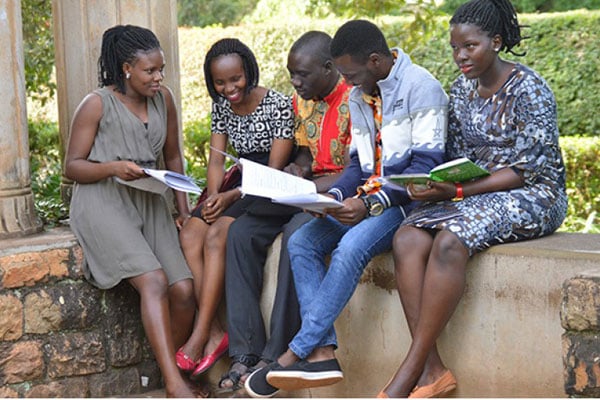Is too much freedom to blame for poor performance at university?

Students discuss at Makerere University recently. There is a growing concern that students performance slumps while at university because of failure to adjust to the transition from secondary school. Photo adopted from Mak website
What you need to know:
- A quick survey among lecturers revealed that students’ performance declines at university. But is the freedom that comes with joining university responsible for this?
- She says this is climaxed by the independence that they are accorded which many do not use to their benefit. “You find a student who was used to being pushed to class for lessons no longer has any one to push them, this automatically will affect their performance negatively,” she observes.
During the 67th graduation ceremony at Makerere University, at least 50 Law students graduated with pass degrees. According to the graduation list that was released then, only nine out of the 247 students that were graduating managed to attain second class upper degrees.
This was a decline in performance on the side of the students because for one to be eligible for the Law degree pre-entry exams at Makerere University, they must have obtained a minimum of 13 points for boys and 12 for girls.
According to Dr William Tayebwa, the head of department of Journalism and Communication at the School of Languages, Literation and Communication at Makerere University, basing on successive progression in performance, students who join the university with 10 points and above should be able to at least graduate with a second class upper degree.
He, however, notes that many students fail to maintain the grades because of the amount of freedom availed to them.
“The environment at university is quite different from that in secondary schools. University is a free world where students are expected to manage their own time and lifestyle, but on the contrary most misuse this liberty,” he says.
Mode of teaching
Dr Tayebwa adds that the change in the mode of delivery of lectures is also different from that in secondary schools. “In secondary schools, teachers will research on behalf of the students and teach them which is different at university,” he notes.
Angeline Kisakye, a Development Studies lecturer at Kyambogo University, says the reason some students deteriorate in performance is because of the excitement of getting into a new environment.
She says this is climaxed by the independence that they are accorded which many do not use to their benefit. “You find a student who was used to being pushed to class for lessons no longer has any one to push them, this automatically will affect their performance negatively,” she observes.
But there are also external factors such as lecturers not fully dedicating their time to students. Jovan Tindyebwa, a lecturer at Makerere University of Business Studies (MUBS), for instance says the poor remuneration of lecturers is to blame. He says many times lecturers strike demanding salary arrears at the expense of student’s learning.
Managing time
Shadrack Natamba, a lecturer at Uganda Christian University, Mukono, says it is important that students who join universities with good grades strive to maintain them. “Do not allow yourself to join university with good grades and get out with a pass degree. Take it upon yourself to maintain or even score a better result than the one you joined,” he says.
And he says this is possible if the students are able to manage their time well, research deeper and have a mentor that is in line with their course of study.
But Kisakye says universities need to start organising counselling sessions for year one students to prepare them for the transition.
She adds that during these counselling sessions students should be guided on how to manage their lives in the new independent environment. As well as how to balance their social and academic life.
Use your time profitably
Shadrack Natamba, a lecturer at Uganda Christian University, Mukono, says it is important that students who join universities with good grades strive to maintain them. “Do not allow yourself to join university with good grades and get out with a pass degree. Take it upon yourself to maintain or even score a better result than that which you joined,” he says.
What students say
“The issue of new obligations is quite challenging. At university you are welcomed by new responsibilities; you are in the lecture room while your mind is lingering on what you will have for supper especially for the private students.” Elisha Muwanga, Makerere University
“The failure to manage the liberty that comes with university in most times is a big problem. The student who was performing well in high school due to an environment that allows for concentration will most likely fail.”
Joel Akugizibwe, Kyambogo University
“Sometimes students have financial constraints. You find someone has no money to buy handouts and yet parents especially those who have studied at university before may not be able to accept that at university you buy notes.”
Daphne Akampurira, Kyambogo Univeristy
“The mode of teaching in high school is quite different from that of university. Students come when they are used to being spoon-fed by teachers only to find lecturers who tell you research which is most times is hard to adapt to.” Wesley Itaagi, Makerere University
“I think in secondary school students are used to having someone who manages them, tells them when to go to class, have meals and revise which is not at university. This freedom affects their performance.”
Jonathan Ssemujju, Makerere University




